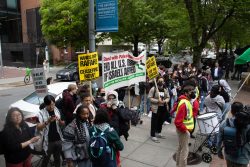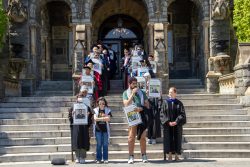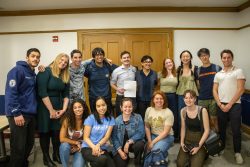Efforts to make sense of Tuesday’s tragic events and discussions on how the United States should respond to them provided the focus for a panel held Wednesday evening in Gaston Hall.
Government Professor Anthony Arend, who moderated the panel which featured four Georgetown faculty members, said its main focus was to discuss “a day in which we’ve had a lot of questions.”
Tuesday’s attacks resulted in the destruction of the World Trade Center as well as significant damage to portions of the Pentagon and has been called the most brutal terrorist attack ever carried out against the United States.
School of Foreign Service Professor Michael Brown tried to discount what he said were a host of misperceptions about the attacks that have already surfaced in the past two days.
Contrary to media reports that have called the attacks highly sophisticated, Brown said they should be placed on the “low-tech spectrum.” According to Brown, calling the attacks “highly sophisticated” stems from a sense of American arrogance that only the most-well trained attacks can succeed against the United States.
Faulty airport security, Brown said, is more to blame for the terrorist attack.
“Airport security in this country is a joke,” Brown said, citing a Department of Transportation study last year in which investigators were able to breach airport security 95 percent of the time.
Brown said that while President Bush may speak of America as the “bastion of freedom,” Americans need to understand that we are not universally loved and respected. In some parts of the world, he said, our policies “have generated fear, loathing and hatred.”
According to the New York Times, available evidence produced thus far shows that Saudi billionaire Osama Bin Laden, who orchestrated attacks against U.S. embassies in Kenya and Tanzania, was most likely responsible for the attack, possibly in conjunction with militant Islamic groups located in Afghanistan.
Even if Islamic militants orchestrated Tuesday’s attack, Professor Mary Lancaster, Director of the Master of Science in Foreign Service program, said the American public should not direct their anger against Arab-Americans or American Muslim groups. Doing so, Lancaster said, “puts us in the same class with the terrorists.”
Audrey Cronin, Peace and Securities Program Professor, a terrorist expert, said she hopes the attacks do not lead to a greater degree of racial profiling in the area of law enforcement.
“I am very worried about the backlash,” Cronin said.
According to Brown, the United States should make a more concerted effort to improve its image in the Middle East, assuming Islamic groups orchestrated Tuesday’s terrorist attacks. Brown said the United States has entered into three separate conflicts in the post-Cold War era to protect Muslims?Kurds in the 1991 Persian Gulf Conflict, Bosnian Muslims in 1995 and Kosovars in 1999. These realities, Brown said, are not reaching the Islamic community.
Former U.N. Ambassador Donald McHenry said that the American public should resist the overwhelming temptation to simply “do something” in the wake of these disastrous terrorist attacks.
“Reacting without the facts,” McHenry said, “could lead us down the wrong road.” McHenry cited the situation in the aftermath of the 1995 Oklahoma City bombing, when early media reports erroneously accused Islamic militants for carrying out the attack against the U.S. federal building.
According to McHenry, the United States should also avoid acting unilaterally against possible terrorist suspects.
“Whatever we decide to do,” McHenry said, “it should be something the international community believes strongly in.”
Simply retaliating for the sake of retaliation, McHenry said, might just “create a whole new generations of Osama bin Ladens” who will grow up hating Americans and simply perpetuate the cycle of violence.
McHenry said that spending billions of dollars toward developing a National Missle Defense system, a plan President Bush advocates, could not have stopped such a terrorist attack.
“I don’t think there is anything we could do that would give us an absolute degree of security,” McHenry said.
According to Cronin, the United States needs to alter its policy approach toward combating terrorism. Short-term solutions, she said, do not serve as an effective deterrant.
“Pushing for a long-term, coordinated strategic response,” Cronin said, “is the only effective way Americans can fight terrorism.”
Cronin concluded by saying that though we might not have been able to control Tuesday’s wave of terrible violence, we do have control over our emotions.




